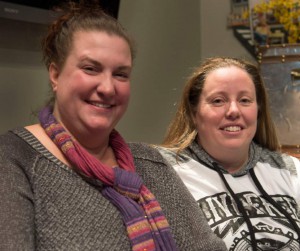Utah Judge Was Wrong To Order Gay Couple to Surrender Foster Child
Judge Scott Johansen ordered a lesbian couple to give up the one year old child living in foster care in their home. Beckie Peirce and her wife, April Hoagland, were caring for the child while the state terminated the biological mother’s parental rights. Peirce and Hoagland were married last October and were licensed as foster parents earlier this year. Judge Johansen claims he has research to back up that children do better in heterosexual homes. A copy of the order currently isn’t available, but a court spokeswoman confirmed its contents.
Aside from the alleged research, there doesn’t appear to be a legal basis for Judge Johansen’s ruling. Utah doesn’t have a law prohibiting same-sex couples from adopting children. According to Hoagland, “the mother has asked us to adopt” the infant girl. Neither the Utah Division of Child Family Services nor the Guardian Ad Litem Office have advocated that the baby be removed from the couple’s care. No party, other than Judge Johansen, believes the adoption would be a bad idea.
Child’s Best Interest
In any child custody case, the deciding question should always be whether the decision is in the child’s best interests. The child’s welfare cannot be traded for the desires of the “adults.” The only evidence available is that Judge Johansen has research showing that children do better in heterosexual homes.
However, all factors must be considered to determine whether the custody decision is in the best interests of the child. Factors such as employment of each parent, the emotional, mental, physical, and educational needs of the child, level of responsibility each parent has, and the nature of the child’s  relationship must all be considered. The sexual orientation of the parents, if it is a factor at all, should only play a small role. It certainty shouldn’t be the deciding factor, as is the case here.
relationship must all be considered. The sexual orientation of the parents, if it is a factor at all, should only play a small role. It certainty shouldn’t be the deciding factor, as is the case here.
Second, “better off” cannot be a legal standard. People come from different backgrounds, but nobody can say that one experience is better than another as long as basic emotional, mental, physical, and educational needs are met. Children grow up in households where the parents are of mixed race, different religions, different political ideologies, or different income levels. Children may have multiple siblings or be an only child. The point is, being different may be harder, but the law doesn’t remove custody simply because a child could be in a “better” environment.
Justice is Based on Judgment of the Individuals
Third, breaking up a family based solely on research is not acceptable. Social studies research deal with generalizations, but the law must judge people as individuals. A research showing that children with heterosexual couples are better off than children with gay couples cannot be the basis for a legal decision unless the research is applied to the specific case. Being gay cannot be a reason to exclude homosexuals from foster parenting and adoption if the judge cannot point to a problem with the specific gay couple’s parenting.
Indeed, social science research makes all kinds of conclusions that courts would be unwillingly to act on, even the conclusions favor certain results. For example, there’s a new study showing that children raised in religious households are more selfish and judgmental than children raised without religion. By Judge Johansen’s reasoning, we should remove children from Christian and Mormon households and give them to atheists because of this research. But we know that this wouldn’t be right. Religious parents must be judged as individuals and not based on a generalized (and flawed) study. Gay couples shouldn’t be treated any differently.
The limited information available doesn’t exclude Hoagland and Peirce as capable parents. They are already raising two children, ages 12 and 14, who are Peirce’s biological children. The infant has already spent three months with them, so there may be a small emotional bond already. The mother has allegedly given her blessing and Utah’s Child Services haven’t found evidence of abuse. The baby’s situation could be better, but Judge Johansen suggests that any heterosexual couple would be more qualified. If the heterosexual couple included the baby’s father or a blood relative, there may be an argument.
However, to suggest that a random heterosexual couple would be better parents than Hoagland and Peirce would be absurd. The two women are experienced parents who have met Utah’s criteria for foster parenting and are prepared to take on additional parental responsibilities.


Comments